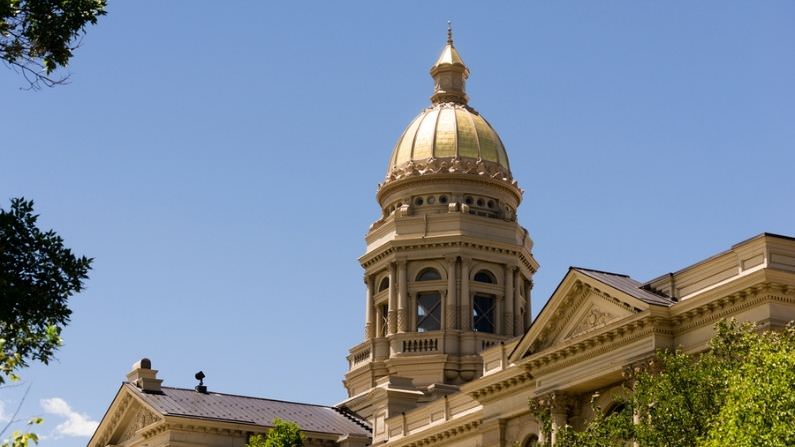EDITOR’S NOTE: The four-week budget session in Cheyenne is moving quickly. As such, the details related to bills discussed in this story may have changed since press time. Stay tuned for KHOL’s weekday newscasts and our weekly podcast Jackson Unpacked for continued coverage throughout the session.
It was an up and down first week for Teton County legislators, who as Democrats or Independents are largely outnumbered while fighting for Jackson Hole residents. Rep. Mike Yin (D-Jackson) was handed an early loss on his county optional real estate transfer tax bill, which he introduced Wednesday.
“The median home price in the last quarter in Teton County county was $2.9 million for a house. Think about that. This affects our workforce. This affects people in higher education,” Yin said. “It affects being able to hire snowplow drivers, judges, anything that lives and works in Teton County.”
The bill was supported by the entire local delegation. It was also sponsored by the House Revenue Committee and endorsed by the Jackson Hole Chamber of Commerce—the largest chamber of commerce in the state. What it would have done was allowed county residents to vote on whether or not they want to impose a 1% hike on all properties sold for over $1.5 million. But folks from elsewhere in the state spoke against it.
“As a realtor, we oppose this. There’s lots of issues with the bill itself,” said Rep. Mark Baker (R-Green River).
“This is an unequal taxation. The only people that are being taxed is residential and commercial,” said Rep. Shelly Duncan (R-Lingle). “The people who would be voting for this are renters who are not having to take this burden.”
The final vote just to get the bill introduced wasn’t even close—19 “ayes” to 40 “nos.” So, it’s back to the drawing board for a proposal that could raise tens of millions in revenue for local affordable housing projects—and kick some revenue back to the state.
Some of Yin’s other ideas had more early success, though, notably a property tax refund program. Sen. Fred Baldwin (R-Kemmerer) introduced the concept Wednesday and outlined who the legislation is trying to help.
“They’ve bought their house. They own it. They’re retired. They’re on a fixed income. Now, the taxes are becoming so high because of the elevated property values, they can’t afford to live there anymore,” Baldwin said. “This bill gives us one method of relief or something like that.”
The bill would allow local residents to get partial refunds on their annual property tax bill, with some caveats: You have to have lived in your home for over five years and you have to reside there for at least nine months out of the year—basically, no second homeowners allowed.
Lots of lawmakers had questions and the measure still has to be voted up twice more and then pass the state house and governor’s desk in order to become law. But Sen. Bill Landen (R-Casper) spoke up amidst nuanced debate and potential amendments, saying his residents don’t have time to wait on this.
“This might be the number one issue that I’m hearing about in my community,” he said. “I’ve had dozens of people indicate to me that we’ve got to do something on this front.”
Other wide-ranging proposals also continue to move forward, largely focused on Republican priorities. One bill introduced in the house would ban abortions once a fetus has reached viability, provided the Supreme Court overturns Roe v. Wade. Others from the senate would prohibit the teaching of critical race theory in schools and end the practice of crossover voting in primary elections. Medical marijuana also awaits debate.
But the major task the legislature has to make a decision on this session is Wyoming’s budget.
Billions of dollars in federal funding are set to be allocated across Wyoming, and Gov. Mark Gordon has released his plan for what he’d like to spend it on, prioritizing education, infrastructure and economic development. One of the most controversial proposals, though, has to do with mental health. Wyoming’s suicide rate was first in the nation in 2019—the most recent year for which data is available—and the Cowboy State has consistently ranked in the top five in previous years.
Baldwin introduced an amendment to the budget that would have allocated just over $2 million to create a 24/7 suicide hotline. That’s something the state doesn’t currently have and which providers say could help people access local resources, rather than national ones.
“When you’re trying to explain [to] them, you can’t go to your mental health care center in Powell, Wyoming. There’s not one. And you can’t drive down the road 80 miles because the roads are closed, the wind’s blowing 60 miles an hour and it’s snowing. Somebody in Florida may not understand that,” Baldwin said. “It’s important that we have a local connection and that suicide hotline available 24 hours.”
But others, including Sen. Larry Hicks (R-Baggs), said they just couldn’t support it. The measure failed by two votes.
“This is not how you want to build a program,” Hicks said. “This creates an ongoing obligation to fund this, and an expectation. And you don’t do it with one-time funding.”
Mental health advocates will now try and lobby in the house, otherwise the entire effort will stop in its tracks. Other budget items, as well the statewide redistricting plan, will continue to be the main subjects of debate during week two.
As of press time, Medicaid expansion does not appear to have enough support in either body to be introduced this session. That’s despite supportive rallies in Cheyenne in recent weeks, a letter from hundreds of businesses supporting the measure and a poll from late last year showing that 66% of Wyomingites are in favor of expansion.





